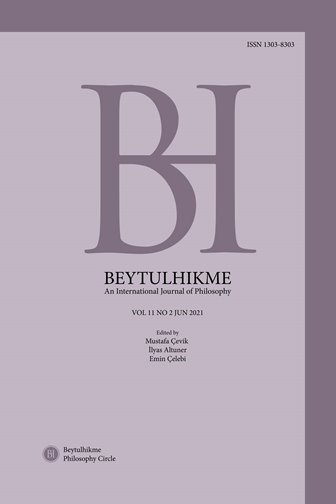Author :
Abstract
Bu çalışma, 12. yüzyılda ortaya çıkan İşrâk felsefesinin günümüzde İran’daki seyrini ele almaktadır. Sühreverdî’den sonra onun ilk dönem şarihleri tarafından karşıtlıklar ve sentezler bağlamında ele alınan İşrak felsefesi tarihi süreçte devam etmiş ve ele alındığı her dönemde farklı sosyal, siyasi ve entelektüel faktörlerle şekillenmiştir. Bugün İran’da hala canlı bir biçimde yaşayan İşrâk felsefesinin Molla Sadrâ okulunun en önemli bileşeni olarak ele alındığını söylemek mümkündür. İran’ın felsefi-entelektüel hayatının şekillenmesinde önemli bir payı olan İşrâk felsefesinin bir tür “sınır” felsefe olduğunun vurgulandığı bu çalışmada aynı zamanda İslam felsefesinin arkaik bir alan olmadığının ve İşrâk felsefesinin günümüzde karşılaştığımız felsefi sorunlara cevap verildiğinde hala bir en önemli kaynaklardan biri olmasının altı çizilmiştir.
Keywords
Abstract
This study deals with the course of Ishraq philosophy that emerged in the 12th century in Iran today. The philosophy of Ishraq, which was discussed in the context of contrasts and syntheses by his early commentaries after Suhrawardi, has continued in the historical process and has been shaped by different social, political and intellectual factors in every period it is dealt with. It is possible to say that the philosophy of Ishraq, which is still living in Iran today, is considered the most important component of the Molla Sadra school. In this study, which emphasizes that the philosophy of Ishraq, which has an important role in shaping the philosophical-intellectual life of Iran, is a kind of "border" philosophy, it is also emphasized that Islamic philosophy is not an archaic field and that Ishraq philosophy is still one of the most important sources when responding to the philosophical problems we face today.
Keywords
- Akbarî, R.&Uluç, T. (2009). Günümüz İran’ında Felsefî Hayata Genel Bir Bakış Hitit Üniversitesi İlahiyat Fakültesi Dergisi. 8/15, 59-75.
- Alıcı, M. (2015). Şehrezûrı̂’de Gnostik Eğilimler (Şerhu Hikmeti’l-İşrâk Özelinde). Şeyhü’l-İşrâk’ın İzinde (İlk Dönem İşrâk Şârihleri (ed. M. Nesim Doru vd). Ankara: Divan Kitap, 103-130.
- Corbin, H. (2010). İslam Felsefesi Tarihi-I. (çev: H. Hatemi). İstanbul: İletişim Ya- yınları.
- Deştekî, G. M. (2003). İşrâku Heyâkil’n-Nûr li Keşfi Zulûmâti Şevâkili’l-Ğurûr. (thk: Ali Ucebî). Tahran: Miras-i Mektub.
- Devvânî, C. (2010). Şevâkilu’l-Hûr fi Şerhi Heyâkilu’n-Nûr. (thk: M. A. Koken). Bağ- dat: Beytü’l-Varrak.
- Doru, M. N. (2015). Meşrıkî Düşünceden İşrâkî Felsefeye Bir Yol Var mı?, Sühre- verdî ve İşrâk Felsefesi (ed. M. Nesim Doru vd). Ankara: Divan Kitap, 105-134.
- Gutas, D. (2002). The Study of Arabic Philosophy in the Twentieth Century: An Essay on the Historiography of Arabic Philosophy. British Journal of Middle Eastern Studies, 29/1, 5-25.
- Mîr Dâmâd (1988). el-Kabasât. (ed: M. Muhakkık). Tahran: Tahran U ̈niversitesi Ya
- Mollâ Sadrâ (1982). Kitabu’l-Meşa‘ir. Tahran: Ketabhane-i Tahurî.
- Mutahharî, M. (2011). Mukaddime. H. Tabâtabâî, Usûlu’l-Felsefe. (Arp. Çev: Cafer Subhanî). Beyrut: Dar Cevadi’l-Eimme, 9-56.
- Nasr, S. H. (1997). Three Muslim Sages. New York: Caravan Books.
- Öçal, Ş. (2018). İran’da İşrâkî Düşüncenin Seyri. Osmanlı ve İran’da İşrâk Felsefesi. (ed: M. Nesim Doru vd). Ankara: Divan Kitap, 31-48.
- Putyagina, V. (2019). Shihab ad-Din as-Suhrawardi al-Maqtul and His Ishraq Sys- tem Within Islamic Culture. Advances in Social Science, Education and Humanities Research. 329, 2196-2198.
- Razavi, M. A. (1997). Suhrawardi and the School of Illumination. Richmond: Curzon Press.
- Sühreverdi ̂, Ş. (2001). Hikmetu’l-İşra ̂k. Mecmu‘a-i Musennefât-ı Şeyh-i İşrâk, 2. (ed: Henry Corbin). Tahran: Pejuheşgâh-i Ulûm-i İnsânî ve Mutala‘at-i Ferhengî.
- Sühreverdî, Ş. (2001). Kitâbu’l-Meşâri‘ ve’l-Mutârehât. Mecmu‘a-i Musennefât-ı Şeyh-i İşrâk, 1. (ed: Henry Corbin). Tahran: Pejuheşgâh-i Ulûm-i İnsânî ve Mutala‘ati Ferhengî.
- Şîrâzî, K. (2002). Şerhu Hikmeti’l-İşrâk-i Sühreverdî. (Nşr: A. Nûrânî-M.Muhakkık). Tahran: Müessese-i Mutalat-i İslamî.
- Türker, Ö. (2015). İşrâkîlik Yeni Bir Metafizik midir?. Sühreverdî ve İşrâk Felsefesi. (ed. M. Nesim Doru vd). Ankara: Divan Kitap, 133-140.
- Uygur, H. (2019). İran’da Şii Siyasi Düşüncenin Evrimi. (ran Düşünce Tarihi. (ed: H. Uygur&A. Rexhepî). Ankara: İram Yay., 139-239.
- Walbridge, J. (2015). İşrâkî Yargılarda İbn Kemmûne. (çev: M. Nesim Doru). Şeyhü’l-İşrâk’ın İzinde (İlk Dönem İşrâk Şârihleri. (ed. M. Nesim Doru vd). Ankara: Divan Kitap, 131-154.
- Walbridge, J. (2016). Suhrawardī’s Intimations of the Tablet and the Throne: The Relationship of Illuminationism and the Peripatetic Philosophy. The Oxford handbook of Islamic philosophy). (ed: K. El-Rouayheb&S. Schmidtke). New York, NY: Oxford University Press, 255-277.
- Walbridge, J. (2001). The Wisdom of The Mystic East: Suhrawardî and Platonic Orien- talism. Albany: State University of New York Press.
- Ziai, H. (1996). Shihab al-Din Suhrawardi: founder of the Illuminationist school. History of Islamic Philosophy. (ed. S. H. Nasr&O.Leaman). Routledge, 434-464.
- Ziai, H. (1990). Knowledge and Illumination: A Study of Suhrawardī’s Ḥikmat al- Ishrāq. Atlanta: Brown University.
- Bu çalışma, 2018-2021 tarihleri arasında yürütücülüğünü yaptığım ve Mardin Artuklu Üniver-





